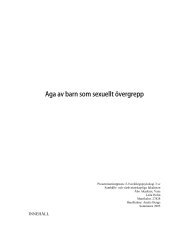Plain Talk about Spanking - Project NoSpank
Plain Talk about Spanking - Project NoSpank
Plain Talk about Spanking - Project NoSpank
You also want an ePaper? Increase the reach of your titles
YUMPU automatically turns print PDFs into web optimized ePapers that Google loves.
"Corporal punishment of children actually interferes<br />
with the process of learning and with their optimal<br />
development as socially responsible adults. We feel it<br />
is important for public health workers, teachers and<br />
others concerned for the emotional and physical health<br />
of children and youth to support the adoption of<br />
alternative methods for the achievement of self-control<br />
and responsible behavior in children and adolescents."<br />
Daniel F. Whiteside, Assistant Surgeon General,<br />
Department of Health & Human Services,<br />
Administration of President Ronald Reagan, 1990.<br />
Excerpt from personal communication.<br />
"When our Founding Fathers wrote into the basic law<br />
of our land protection against cruel and unusual<br />
punishment for everyone including dissenters and<br />
criminals, they had not been convinced by evidence,<br />
scientific or otherwise, that such punishments do not<br />
work. They added the amendment because of ethical<br />
considerations. They prized the climate of freedom more<br />
than the security of governing a populace forcibly of<br />
one mind. Over the years these proud hopes have slowly<br />
approached reality. Except for children. Which brings<br />
us back to our original question: How does it become<br />
possible to bypass standard ethics for certain sets of<br />
people?"<br />
Adah Maurer, "Psychodynamics of the Punisher,"<br />
Watman Educational Services, 1974. See<br />
www.nospank.net/maurer2.htm<br />
"Punitive measures whether administered by police,<br />
teachers, spouses or parents have well-known standard<br />
effects: (1) escape – education has its own name for<br />
that: truancy, (2) counterattack – vandalism on schools<br />
and attacks on teachers, (3) apathy – a sullen do-nothing<br />
withdrawal. The more violent the punishment, the more<br />
serious the by-products."<br />
B. F. Skinner, Ph.D., author, Professor of Psychology,<br />
Harvard. Excerpt from personal communication, 1983.<br />
"Corporal punishment trains children to accept and<br />
tolerate aggression. It always figures prominently in the<br />
roots of adolescent and adult aggressiveness, especially<br />
in those manifestations that take an antisocial form such<br />
as delinquency and criminality."<br />
Philip Greven, Professor of History, Rutgers University.<br />
Excerpt from PART IV CONSEQUENCES,<br />
subheading: "Aggression and Delinquency," in Spare<br />
-7-<br />
the Child: The Religious Roots of Punishment and the<br />
Psychological Impact of Physical Abuse, 1990<br />
"I have always been an advocate for the total abolition<br />
of corporal punishment and I believe the connection with<br />
pornography that is so oriented has its roots in our<br />
tradition of beating children."<br />
Gordon Moyes, D. D., Pastor, Uniting Church,<br />
Superintendent of the Wesley Central Mission, Sydney,<br />
Australia. Excerpt from personal communication, 1980.<br />
"The much-touted 'biblical argument' in support of<br />
corporal punishment is founded upon proof-texting a<br />
few isolated passages from Proverbs. Using the same<br />
method of selective scripture reading, one could also<br />
cite the Bible as an authority for the practice of slavery,<br />
adultery, polygamy, incest, suppression of women,<br />
executing people who eat pork, and infanticide. The<br />
brutal and vindictive practice of corporal punishment<br />
cannot be reconciled with the major New Testament<br />
themes that teach love and forgiveness and a respect for<br />
the sacredness and dignity of children, and which<br />
overwhelmingly reject violence and retribution as a<br />
means of solving human problems. Would Jesus ever<br />
hit a child? NEVER!"<br />
The Rev. Thomas E. Sagendorf, United Methodist<br />
Clergy (Retired), Hamilton, Indiana. Personal<br />
communication, 2006.<br />
"Researchers have also found that children who are<br />
spanked show higher rates of aggression and<br />
delinquency in childhood than those who were not<br />
spanked. As adults, they are more prone to depression,<br />
feelings of alienation, use of violence toward a spouse,<br />
and lower economic and professional achievement.<br />
None of this is what we want for our children."<br />
Alvin Poussaint, M.D., Professor of Psychiatry,<br />
Harvard Medical School. From "<strong>Spanking</strong> Strikes Out,"<br />
1999.<br />
"Infliction of pain or discomfort, however minor, is not<br />
a desirable method of communicating with children."<br />
American Medical Association, House of Delegates,<br />
1985.





